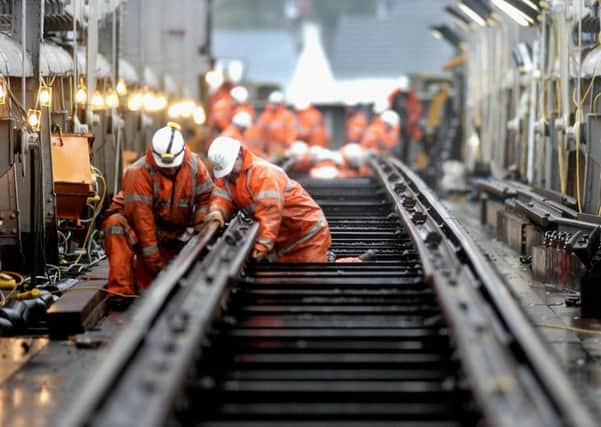RMT set for Britain-wide strike after vote


The threatened walkout among 16,000 Network Rail workers over pay also comes as the first major test for the new Conservative UK government, which is planning new measures to curb strikes.
The RMT has yet to announce any action, but the potential prospect of disruption alone is likely to prompt some passengers to reconsider travel plans.
Advertisement
Hide AdAdvertisement
Hide AdIndustry sources also pointed out that even action short of a strike could be highly disruptive because of the difficulty of finding enough managers to cover staff on days off if there was a work to rule.
RMT members likely to be involved include signallers and track maintenance staff, who are crucial to enable trains to run.
A spokesman for the new ScotRail-Network Rail alliance, which took the Scottish network yesterday, said: “We are developing detailed contingency plans for Scotland’s railway should a strike take place and will seek to run as many services as possible for our passengers.
“Keeping customers informed and helping them to plan in advance will be a key priority during any dispute.
“We will publish our plans as soon as the union confirms what industrial action it intends to take.”
There have been several previous RMT votes for a Britain-wide strike in recent years, but these were averted before any walkout.
The last nationwide stoppages were by the main train drivers’ union Aslef, under British Rail in 1995.
The RMT said 80 per cent of its members had voted to strike, and 92 per cent to take action short of a strike, in a 60 per cent turnout.
Advertisement
Hide AdAdvertisement
Hide AdThe dispute centres on a one-off £500 lump sum as part of the proposed four-year pay deal, which the union has rejected as “wholly inadequate”.
A spokesman said: “The RMT has rejected the latest pay proposals as falling well short of what is required to maintain the living standards, the job security and the working conditions for nearly 16,000 staff across Network Rail operations and maintenance.
“The mandate for action will now be considered by RMT’s executive, which will decide on the next steps in taking the dispute forwards.
General secretary Mick Cash said: “Our members have today decisively rejected the pay package offered by Network Rail.
“This is a massive mandate for action and shows the anger of safety-critical staff across the rail network at attacks on their standards of living and their job security.”
Network Rail chief executive Mark Carne said industrial action would have “a massive impact on millions of passengers”.
He said: “It cannot be right that the unions can hold the country to ransom in this way.
“Our employees have received pay rises eight times higher than other public sector workers over the last four years and have now been offered a deal for the next four years that is unmatched elsewhere.
Advertisement
Hide AdAdvertisement
Hide Ad“The unions have also rejected a number of proposals that would boost productivity, removing our ability to offer them more.”
UK Transport Secretary Patrick McLoughlin said: “I condemn any industrial action that disrupts the travelling public.
“I want to see Network Rail and the unions back round the negotiating table, hammering out a deal.
“Rail passengers will not thank the unions for inflicting this unnecessary disruption.”
New UK Business Secretary Sajid Javid said today the Government will press ahead with introducing new laws to stop public sector strikes going ahead unless they have the support of 40 per cent of workers eligible to vote.
Turnout will have to reach at least 50 per cent of those entitled to vote for a strike to go ahead.
The RMT vote exceeded these thresholds.